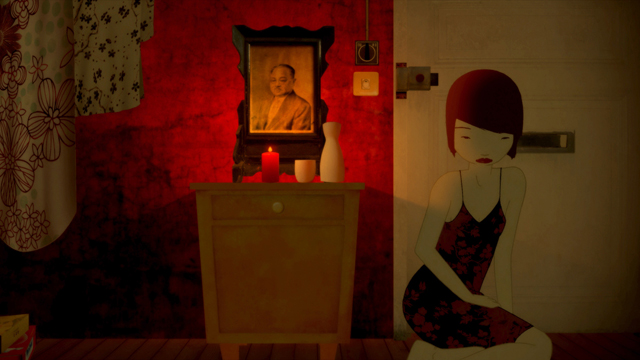In Mei Ling’s opening scene, an attractive young woman is cooking, chopping up a cephalopod in fact. Turns out that a man is coming over for a meal, and, not to be crude, but little bit of the baby-making dance as well. Of course that chopped up octopus had a baby of its own, and in a fateful decision, our young protagonist decides to keep it as a pet. Babies don’t stay babies though, the growing of the octopus marks the passing of time, and the passage of time confirms the young woman’s neglect by our handsome, but absent man.
There is a lot of ways to make a short film work, mercifully I’ll spare you (and myself) from attempts at classification right this very moment, but instead will describe the particular type of short film Mei Ling is via contrast: if the essential difficulty of short film is exposition, the compressed run-time of a short project making it difficult to establish background for plot or character, then one popular way to mitigate this difficulty is evoking other references, via trope, or setting or prop, et al. to inform audiences of the situation at hand or the nature of its characters via a connection to other media they have previously seen. You see this a lot in genre short filmmaking naturally, as one of the great attractive forces of adventure, fantasy or sci-fi is world-creation, a difficult proposition in the short medium. This is not a denigration of this approach by any means, our recent feature, Reign of Death is a very adroit example.
Mei Ling though is the opposite of that, the type of film that instead plays things close to the vest, arriving at the scene and resisting the urge to explainallowing things to unfold organically, as critical information arrives via a gradual implicit understanding by the audience. The Most Beautiful Man in the World is one of my favorite examples of this approach to short filmmaking, but it is a difficult row to hoe, as it demands a sort of patience and attentiveness from its audiences. At 15 minutes, much of it with little discernible plot development, Mei Ling certainly challenges audiences via its storytelling, in spite of, in my opinion, ultimately delivering in this department due to its expert rhythm and flow.
However if some get bored along the way, it’s fortunate that Mei Ling simply overwhelms you with ideas visually. Out of France, the short animation is the product of fruitful collaboration between a Goebelins alum, François Leroy, and Stéphanie Lansaque, a magazine art director and designer. The result is a short film where the creativity on display in shot after shot is mesmerizing. The film is one of the most successful I’ve thus far seen in incorporating 2-D aesthetics in a 3-D environment, but beyond that Ms. Lansaque’s background shows, as the environment of the film is a delight, invoking its Hong Kong apartment with the type of vintage, nostalgic detail world cinema lovers will recognize from Wong Kar Wai. Furthermore, frequent experiments in combining CG with photographs litter the film, and the credits, both opening and closing, are worth watching just for themselves. Really cool.
If that wasn’t enough, the filmmaking duo seem to transcend their specialties with a decided flair for filmmaking itself. I stopped counting the number of inventive shots I witnessed about halfway through. Neat smash cuts, slow zooms and brief, ephemeral scenes, really lure audience members into the assured direction of the film. Use of virtual cameras, whether it be POV’s or complicated jib shots are always tasteful, unlike a certain other famous French co-ed animation team.
Mei Ling is on the internet via Fluxus, the Brazilian festival we spotlighted a while back. Due to ownership protections we can’t present the film properly in the shadowbox, but hopefully that provides you with a good excuse to check out some of the other entries via the Fluxus website, as there are several quality films. I’m thankful to have found this one; in country notable for its animating talent, Mei Ling is in my mind the most notable French animation since Skhizein.

 Jason Sondhi
Jason Sondhi